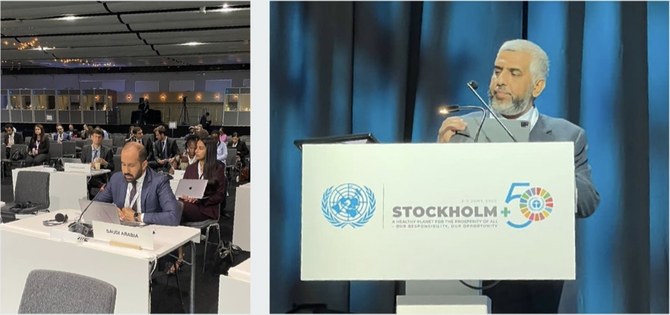RIYADH: Saudi Arabia on Friday highlighted the local and global efforts it is making to protect and preserve the environment, including numerous programs and initiatives designed to achieve its national environment strategy.
It came during the two-day Stockholm+50 conference, at which the Kingdom’s delegation was headed by Abdulrahman Al-Fadhli, the minister of environment, water and agriculture, and Ali Al-Ghamdi, the CEO of the National Center for Environmental Compliance.
Saudi authorities said that their initiatives are also designed to help achieve the objectives of the UN’s Sustainable Development Goals and confront the challenges of climate change, as they stressed the importance of international cooperation in taking the necessary action to secure a better future.
The conference, which began on Thursday, was an international meeting convened by the UN General Assembly in the Swedish capital under the slogan A Healthy Planet for the Prosperity of All — Our Responsibility, Our Opportunity. It took place 50 years after an early environmental gathering in the Swedish capital.
Speaking during the conference, Al-Ghamdi affirmed the Kingdom’s desire to make every effort to achieve the objectives of the country’s national strategy for the environment and its protection. He highlighted the roles of the Saudi Green and Middle East Green initiatives in working to achieve sustainable development and confront the challenges of climate change.
He said the Kingdom believes in the need to guarantee human progress and prosperity, the safety of the planet, and the role of the international community. He also noted that the Kingdom’s ambitious Vision 2030 development and diversification agenda is working to protect, enhance and sustain the country’s natural environment by adopting a holistic view of its ecosystems.
The national environment program was launched to raise the level of environmental commitment in all developmental sectors, reduce pollution and its negative effects on the environment, develop natural vegetative cover, combat desertification, protect wildlife, preserve biodiversity, and transform the waste sector from a linear economy to a circular economy, Al-Ghamdi added.
This is being done by enhancing the participation of the private sector by encouraging improvements to services and stimulating innovation, as well as by raising environmental awareness among the public and strengthening the role of the non-profit sector, he said.
Al-Ghamdi highlighted to the important leadership role of the Kingdom through its presidency of the G20 in 2020, and the statement made by the group’s leaders during the their annual meeting hosted by Riyadh that year, in which they agreed to the aim of voluntarily reducing global land degradation by 50 percent by 2040. To this end they launched a global initiative to enhance the protection of wild habitats, restore land and prevent its deterioration, along with a global initiative to preserve coral reefs. He added that his country is cooperating with the other G20 member states to implement the two initiatives.
In addition, Saudi Arabia has raised the level of its national contribution to climate action by pledging to reduce emissions by 278 million tons annually by 2030, he added, which is more than double the amount previously announced in 2015.
Saudi authorities have launched many initiatives, Al-Ghamdi said, including plans for half of the Kingdom’s domestic energy needs to be provided by renewable energy sources, and to take advantage of carbon capture and storage technologies.
The Kingdom has also announced the target of reaching carbon neutrality by 2060 through a circular carbon economy approach, and joined the Global Methane Pledge, which aims to reduce global methane emissions by 30 percent compared with 2020 levels.































